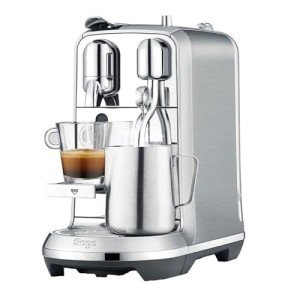The Most Significant Issue With High-Quality Espresso Machines, And How You Can Repair It
The World of High-Quality Espresso Machines: A Comprehensive Guide
Espresso has actually ended up being a beloved beverage among coffee lovers worldwide, understood for its rich flavor, intense aroma, and versatility. The heart of a terrific espresso lies in the machine utilized to brew it. High-quality espresso machines are designed to deliver the best shot, making them a necessary investment for coffee fans. This post checks out different kinds of high-quality espresso machines, their functions, upkeep tips, and responses to frequently asked questions.
Types of High-Quality Espresso Machines
High-quality espresso machines fall into several classifications, dealing with different choices, ability levels, and budgets. The primary types include:
Type of Machine
Description
Ideal User
Manual Espresso Machines
Needs user skill to control extraction and pressure. Provides the most control over the brewing procedure.
Experienced baristas and enthusiasts
Semi-Automatic Machines
Integrates manual operation with automation. Users control the grind and tamping, while the machine handles water dispersion.
Intermediate users
Automatic Espresso Machines
Automate the developing process, enabling programmable brewing times and temperature levels.
Casual coffee drinkers
Super-Automatic Machines
Have integrated mills and are completely automated, managing everything from grinding to developing and steaming.
Users looking for convenience
Commercial Espresso Machines
Developed for high volume use in cafes and restaurants, using resilience and speed.
Company owner
In-depth Overview of Each Type
Manual Espresso Machines
- Pros: Complete control over the brewing process; can produce remarkable quality espresso.
- Cons: Requires significant skill; lengthy.
Semi-Automatic Machines
- Pros: Balanced control, blending manual and automatic processes; remarkable quality espresso is still achievable.
- Cons: Requires some knowledge and experience to master.
Automatic Espresso Machines
- Pros: User-friendly; lowers the discovering curve while still producing high-quality espresso.
- Cons: Still needs some understanding of coffee-making fundamentals.
Super-Automatic Machines
- Pros: Maximal benefit; little skill needed; suitable for people or households who want coffee without difficulty.
- Cons: Higher cost point; may lack the fine-tuning capabilities of manual machines.
Commercial Espresso Machines
- Pros: Built for durability and performance; often includes functions for high-volume turns.
- Cons: Expensive; might be overkill for home use.
Secret Features to Consider
When looking for a high-quality espresso machine, numerous essential functions must be taken into account:
- Pressure and Pump Type: Look for machines with a minimum of 9 bars of pressure, which is essential for extracting the best taste from coffee beans.
- Boiler Type: Single, double, and heat exchanger boilers each affect how the machine carries out and the speed of brewing.
- Construct Quality: High-quality materials such as stainless-steel are more suitable for resilience and looks.
- Relieve of Use and Cleaning: Some machines need comprehensive cleansing, while others are created for easy upkeep.
- Temperature Control: Consistent temperature is vital; think about machines with PID controllers for exact control.
Benefits of High-Quality Espresso Machines
Buying a high-quality espresso machine provides a multitude of advantages:
- Superior Quality: High-end machines permit greater control, leading to more delicious espresso.
- Sturdiness: Built to last, quality machines require fewer repair work and replacements.
- Customization: Users can delight in a tailored experience by adjusting grind size, shot timing, and other settings.
- Increased Convenience: Automatic and super-automatic choices permit fanatics to enjoy espresso with minimal effort.
Maintenance and Care for High-Quality Espresso Machines
To keep an espresso machine working efficiently, routine maintenance is important. Here are tips for preserving a high-quality espresso machine:
Descale Regularly:
- Use a descaling option every couple of months to prevent buildup of minerals from water, which can impact flavor and performance.
Clean the Brew Group:
- For machines with a detachable brew group, tidy it frequently to ensure a clean extraction.
Change Water Filters:
- Use a water filter and change it as required to lessen impurities in your brewing water.
Daily Cleanings:
- Rinse the portafilter and group head after each use to prevent oil buildup.
Watch on the Parts:
- Monitor seals, gaskets, and other parts for wear and tear and replace them as essential.
Regularly Asked Questions (FAQs)
1. What is the best espresso machine for novices?
For novices, a semi-automatic machine typically supplies a great balance of use and control, enabling users to learn the skills needed for making excellent espresso.
2. Are super-automatic machines worth the financial investment?
Yes, for those who prioritize convenience and ease over control, super-automatic machines can be a worthwhile investment, particularly for households or hectic specialists.
3. How Espresso Machines Under £200 should I anticipate to invest in a high-quality espresso machine?
High-quality espresso machines range considerably in rate, with manual machines beginning at a couple of hundred dollars, while super-automatic or commercial machines can surpass several thousand.
4. Can I make other coffee beverages with an espresso machine?
Yes, numerous espresso machines have steam wands or attachments that allow users to create lattes, cappuccinos, and more.
5. For how long do espresso machines usually last?
With proper maintenance, high-quality espresso machines can last over a decade, making them a long-lasting financial investment in your coffee enjoyment.
High-quality espresso machines yield a transformative coffee experience, whether taken pleasure in at home or in a commercial setting. By comprehending the types readily available, their functions, and the upkeep needed to keep them running efficiently, consumers can make educated decisions that raise their coffee-drinking experience.
